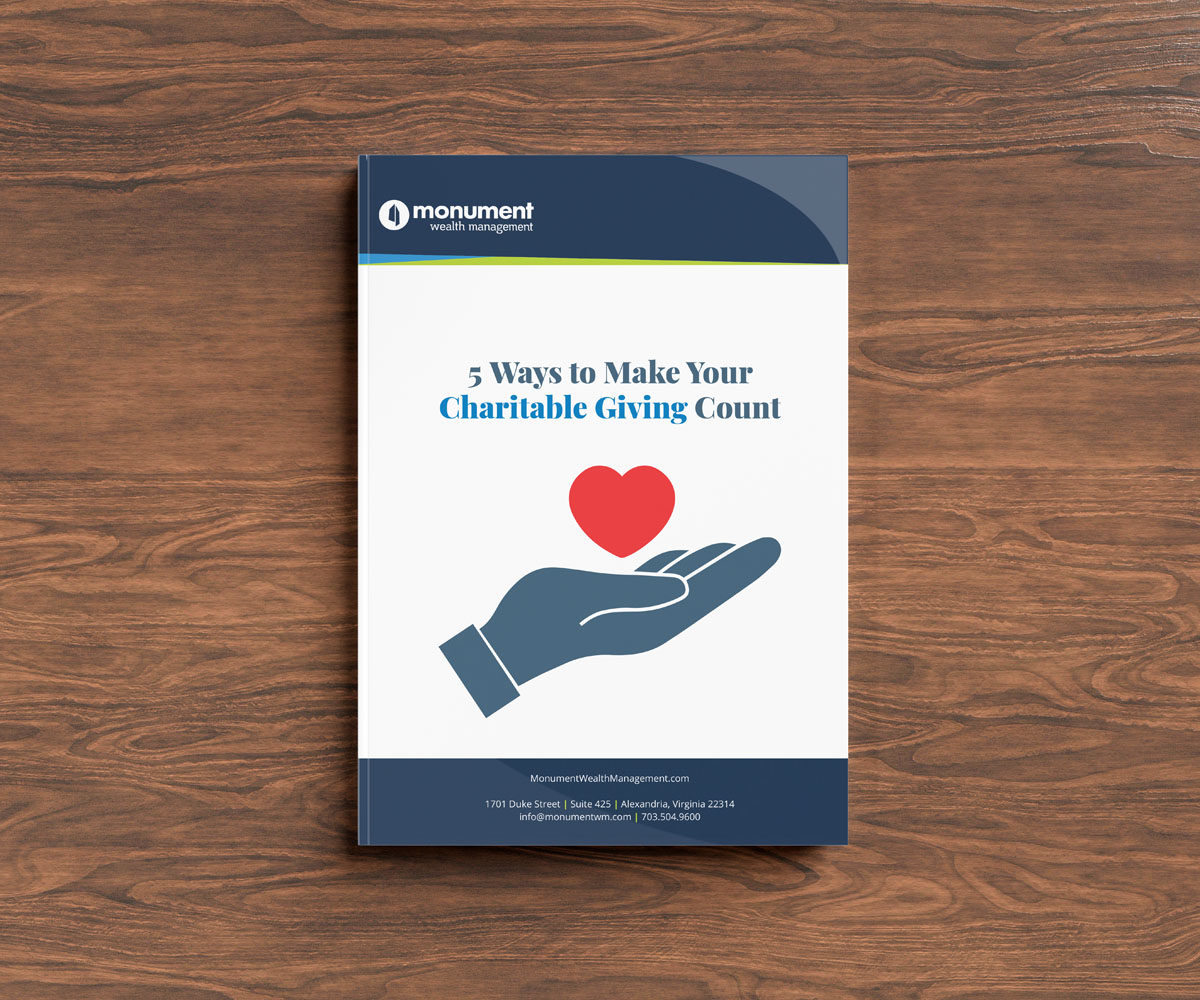Monument Wealth Management Articles
5 Ways to Make Your Charitable Giving Count

Share on your favorite platform, or by email
Picture this scenario we’ve all been in: you’re in the grocery store checkout line. The associate has finished ringing up all your items and, before finalizing your transaction, asks you if you want to donate to the local food bank or children’s hospital. Thinking “why not,” you make an impulse decision and agree to add a few dollars for the cause onto your bill.
Now, there’s absolutely nothing wrong with that scenario. But let’s imagine that instead of donating a couple dollars, you’re donating hundreds or thousands of dollars. Feeling like you want to give out of spur-of-the-moment empathy—or worse, that you have to give out of obligation or guilt—isn’t how you should approach philanthropy. Your giving becomes fragmented and doesn’t actually accomplish your charitable goals.
Just like your personal finances, you need a plan for your charitable giving.
Here’s where to start…
Figure Out Your Charitable Goals
It sounds like a simple question, but it’s actually pretty difficult to answer: what matters most to you? The most productive charitable giving comes from first determining what your charitable goals are. Having this clearly in mind means that you’ll be able to better evaluate charities and solicitations through the lens of “is this truly what matters to me?”
Don’t know where to start? Ask yourself:
What charities, non-profit organizations, houses of worship and educational institutions have touched your life or the life of someone close to you?
What issues or changes have you observed in your own community?
What topics in the news can you not stop reading about?
Is there an opportunity your family has that you wish everyone else had too?
These may help you identify which of the many charitable causes out there resonate with you most.
Get Away from “Checkbook Giving”
Giving to anyone who asks you for money doesn’t help you accomplish your charitable goals. Instead, you end up at the end of the year with a dozen receipts from disparate charities and causes that don’t speak to what you value most. And moreover, you receive little or no communication telling you how your gift actually made an impact.
I get it, it’s tough to say no to the friend who’s raising money for a charity half marathon or to the solicitation from the local animal shelter. But being clear on your philanthropic priorities, and taking the time to vet organizations that fit within those priorities, means that you’ll have more money available to give and to create the meaningful impact you want to see.
Don’t Dismiss Funding for General Operations at Non-Profits
Having worked in philanthropy, I know how appealing it is for donors to give to a particular project or initiative at an organization—the inside-baseball term for this is “restricted funding.”
It may feel like this is the best way to make your donation count. But think about it from the organization’s perspective: receiving only restricted donations means they don’t have enough “unrestricted” money to fund their general operations—to pay rent, to buy supplies, and to pay the salaries of the people who are doing the work to advance the organization’s mission.
Giving unrestricted funds essentially helps the organization you value keep the lights on and, furthermore, to pivot quickly if the needs of who they’re serving change. Unrestricted funding may not sound as interesting, but trust me, to small organizations in particular, it’s critically important.
Don’t Think About the Tax Benefits of Charitable Giving (At First)
Yes, there are a lot of tax benefits to philanthropic giving, but truthfully, if saving on taxes is your primary motivation when giving to a charity, then you’re approaching this all wrong.
Socking money away in a charitable giving vehicle each year without having any plan as to where and how to distribute the funds defeats the purpose of why such vehicles exist: to help you give to charity. Think about your philanthropic intentions first, and then we can talk further about tax saving opportunities.
Have Big Plans? Consider a Donor Advised Fund
Maybe you aren’t just thinking about your charitable gifts for the coming months. Maybe you’re getting a windfall this year, such as from a business sale or inheritance, and you’d like to earmark a portion for charity, but you don’t know yet which charity and how much. Maybe you want to make a transformational gift to an organization in a few years that will take time to accumulate. Maybe you have a large amount of appreciated stock that you’d like to use to fund charitable gifts, but you’re hesitant to realize big capital gains.
If any of these situations sound familiar, a Donor Advised Fund (DAF) may be a good fit for you. A DAF is a type of charitable giving vehicle. You receive a tax deduction in the year you make a contribution (contributions can be made at any time during the life of the DAF) equal to the full value of the assets you contributed, and you can distribute donations on a flexible time table (no minimum or maximum annual distribution requirements). You can also invest funds in a DAF so that they will grow or generate income, depending on your philanthropic goals—all of which is tax-free since money in a DAF is qualified charitable funds.
When it comes to philanthropy, there’s a tendency to both overcomplicate and oversimplify it. Remember that your charitable dollars have the biggest impact when they’re serving the larger picture. Having a plan for your charitable giving means that the next time you’re in the metaphorical grocery store checkout line, you’ll be confident that you’re giving with purpose.
To learn more about creating a charitable impact, I recommend starting with this book below and giving us a call at 703-504-9600.

5 Ways to Make Your Charitable Giving Count
Ready for straightforward, unfiltered opinion and tailored advice for YOUR
questions, not everyone else’s?
IMPORTANT DISCLOSURE INFORMATION
Please remember that past performance is no guarantee of future results. Different types of investments involve varying degrees of risk, and there can be no assurance that the future performance of any specific investment, investment strategy, or product (including the investments and/or investment strategies recommended or undertaken by Monument Capital Management, LLC [“Monument”]), or any non-investment related content, made reference to directly or indirectly in this blog will be profitable, equal any corresponding indicated historical performance level(s), be suitable for your portfolio or individual situation, or prove successful. Due to various factors, including changing market conditions and/or applicable laws, the content may no longer be reflective of current opinions or positions. Moreover, you should not assume that any discussion or information contained in this blog serves as the receipt of, or as a substitute for, personalized investment advice from Monument. To the extent that a reader has any questions regarding the applicability of any specific issue discussed above to his/her individual situation, he/she is encouraged to consult with the professional advisor of his/her choosing. No amount of prior experience or success should be construed that a certain level of results or satisfaction will be achieved if Monument is engaged, or continues to be engaged, to provide investment advisory services. Monument is neither a law firm nor a certified public accounting firm and no portion of the blog content should be construed as legal or accounting advice.
A copy of Monument’s current written disclosure Brochure discussing our advisory services and fees is available for review upon request or at www.monumentwealthmanagement.com/disclosures. Please Note: Monument does not make any representations or warranties as to the accuracy, timeliness, suitability, completeness, or relevance of any information prepared by any unaffiliated third party, whether linked to Monument’s website or blog or incorporated herein, and takes no responsibility for any such content. All such information is provided solely for convenience purposes only and all users thereof should be guided accordingly.
Historical performance results for investment indices, benchmarks, and/or categories have been provided for general informational/comparison purposes only, and generally do not reflect the deduction of transaction and/or custodial charges, the deduction of an investment management fee, nor the impact of taxes, the incurrence of which would have the effect of decreasing historical performance results. It should not be assumed that your Monument account holdings correspond directly to any comparative indices or categories. Please Also Note: (1) performance results do not reflect the impact of taxes; (2) comparative benchmarks/indices may be more or less volatile than your Monument accounts; and, (3) a description of each comparative benchmark/index is available upon request.
Please Remember: If you are a Monument client, please contact Monument, in writing, if there are any changes in your personal/financial situation or investment objectives for the purpose of reviewing/evaluating/revising our previous recommendations and/or services, or if you would like to impose, add, or to modify any reasonable restrictions to our investment advisory services. Unless, and until, you notify us, in writing, to the contrary, we shall continue to provide services as we do currently. Please Also Remember to advise us if you have not been receiving account statements (at least quarterly) from the account custodian.
